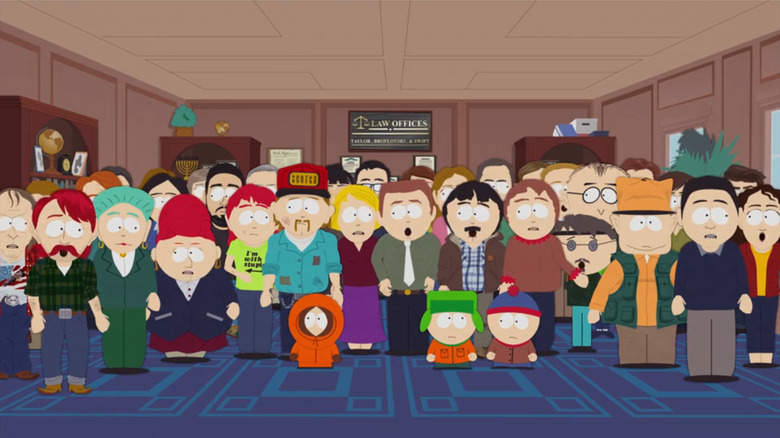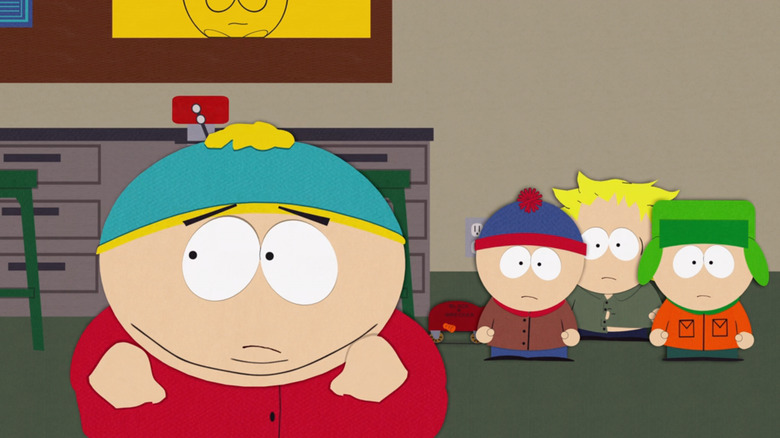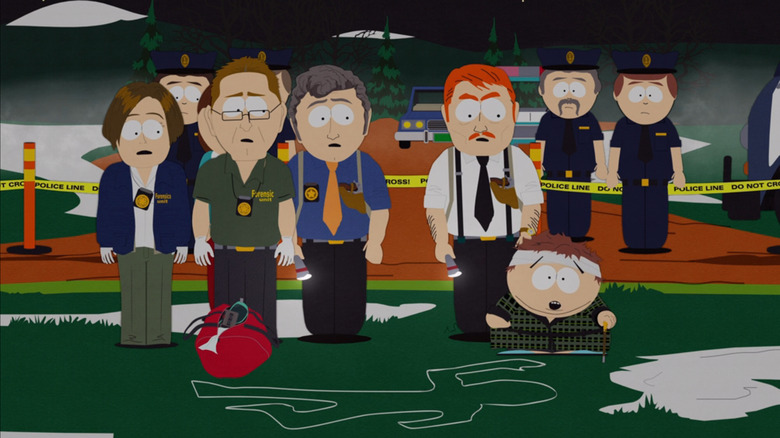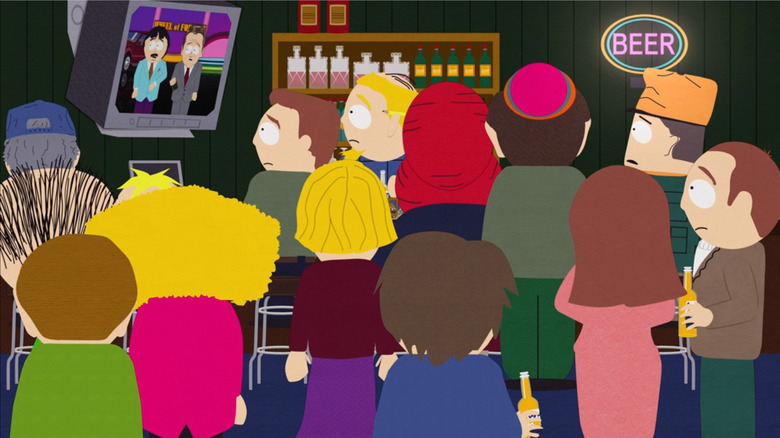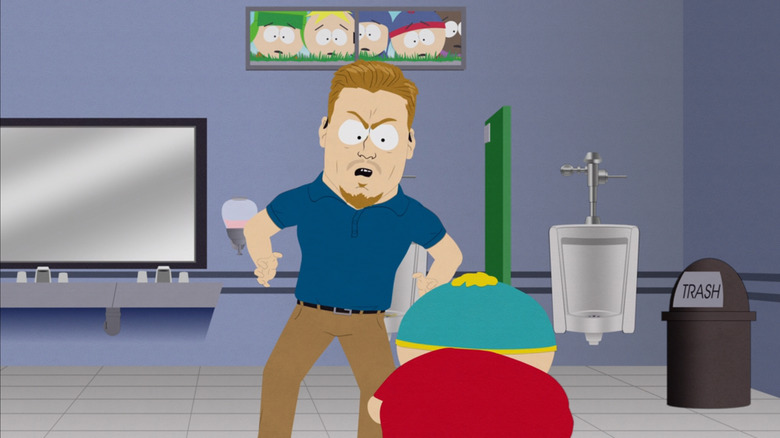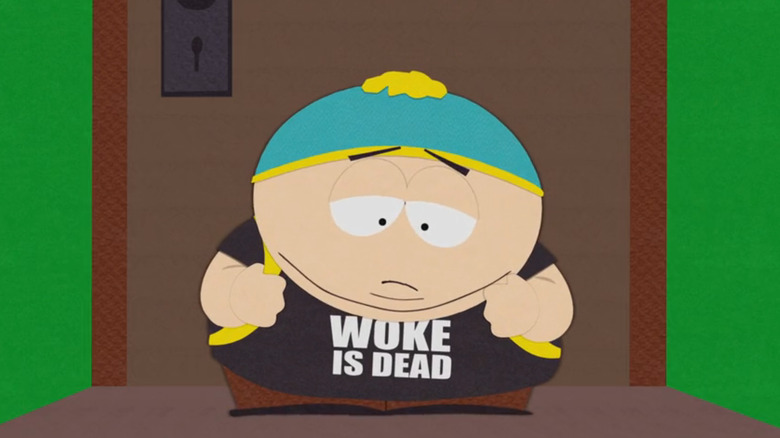5 Essential South Park Episodes Everyone Should Watch At Least Once
"South Park" has over three hundred episodes under its belt, the first of which premiered over 25 years ago. Trying to streamline the show to merely five essential episodes is a near-impossible task, but we're gonna try it out anyway.
The goal of this list is not to recommend the five best episodes, or even the five episodes that most impacted the larger plot of the series. No, the point is to offer five episodes that will give viewers the best idea of how the show has evolved. I'll be separating the show into five different eras and picking one episode from each of them, one that I consider to be typical of that period. "South Park" has evolved constantly over its decades-long run, and unlike other animated sitcoms, it can't be easily split into a "good" early era and a "bad" later one.
Tragically, this approach means that my personal favorite episodes of the show — which include the one where Wendy beats the crap out of Cartman and the one where the kids try to lose their Little League tournament — will not be here. Those may be the most entertaining, but I don't think they're the most essential to understanding the show.
Tweek vs. Craig (season 3, episode 5)
This is a regular season 3 outing that aired in June 1999, and I picked it not merely because I'm a hardcore Creek shipper. (See #7 of my list of best ever "South Park" episodes). If you're more familiar with the later seasons of "South Park," the main thing that may stick out to you with "Tweek vs. Craig" is how indistinguishable Kyle and Stan are. They are both total a-holes in this episode, stirring up a big fight between the innocent Craig and Tweek for no other reason than they think it'll be fun to watch.
Within a few years, the show would firmly establish Kyle as the righteous character in the group, the one most likely to stand up for what he believes in, even if it'd be easier to mind his business. Meanwhile, Stan would be established as the calmer of the two; he'll generally agree with Kyle's take on the situation, but he'd rather make peace between the two fighting groups. In "Tweek vs Craig," however, Kyle and Stan are interchangeable jerks no better than Cartman.
Speaking of Cartman, you'll notice that he's not a villain in this episode. He's on the same moral level as Stan and Kyle, which is par for the course in the early seasons. Up until the next episode on this list, Cartman was more likely to be bullied than to be the bully himself. Stan and Kyle were often jerks to him about his appearance with little provocation, a dynamic the later seasons would largely do away with.
Outside of the specific character dynamics, "Tweek vs. Craig" presents a version of the show that's notably childlike. Later seasons would give more time and depth to the show's adult characters, but season 3 was more content to let its third-grade characters (not fourth-grade yet) keep the center stage.
'Cartman's Incredible Gift' (season 8, episode 13)
Season 8 is firmly in the post-Scott Tenorman years, which means Cartman has embraced his evil ways and now enjoys his role as the show's main villain. For this list, I wanted to pick an episode that really highlights Cartman at his most horrible. Do I pick the one where he pretends to have Tourette's so he can call people slurs in public? The one where he attempts to start a second Holocaust? I almost focused on Cartman's worst crime of all: when he ate all the skin off those KFC chicken wings right before the rest of the boys were about to eat them.
I settled on "Cartman's Incredible Gift," which highlights not only Cartman's penchant for cruelty but his total obliviousness. Cartman hits his head after foolishly attempting to fly, and then starts a career as a murder-solving psychic. He ruins countless people's lives at this job, all while failing to catch the actual serial killer on an active murder spree.
This is a typical format of a "South Park" episode at this point in the show: Cartman is being a menace, Kyle tries to stop him, but the adults in "South Park" are so incompetent that it's up to the kids to finally shut down Cartman's antics. We may be eight seasons in at this point, but this is the era of "South Park" that most people think of when you mention the series.
'With Apologies to Jesse Jackson' (season 11, episode 1)
I should confess: I don't love this episode, but I'm including it anyway because it features a few important moments in the show's history. The first such moment is Randy's infamous utterance of a slur on a live episode of "Wheel of Fortune." It's an uncensored moment that demonstrates how far "South Park" is willing to go in its shock humor. Few networks would let their sitcom make a joke like this, and few showrunners would dare to write the joke in the first place.
The other thing of note here is that "With Apologies to Jesse Jackson" involves a type of "South Park" plot point more casual viewers often ignore: Cartman sometimes gets the win. Here, Cartman successfully torments a man with dwarfism, driving the guy to near-insanity. In the end, the man decides to stoop to Cartman's level and challenges him to a fight, only for Cartman to win it with ease. It's a storyline that I find pretty mean-spirited and frustrating to watch, but which has, for some reason, been well-received by "South Park" fans overall. I, for one, hate it when Cartman gets the win, but casual viewers should understand that this is a thing that happens every now and again.
Perhaps most important of all is that you can really see the rise of Randy on display here. The adults are written with increasing depth and focus as the show goes on, and Stan's foolish dad Randy is the clearest example of this. You'll see he's really driving the plot in this episode, something that'll only happen more often from this point forward.
'Stunning and Brave' (Season 19, episode 1)
After enjoying a surprisingly long and late-stage golden age (I'd place it at seasons 6 through 13), the quality of "South Park" stagnated in its mid-teen years. Fans worried its best days were over, that the writers were growing bored and running out of ideas. But then came season 19, which took on a serialized approach that gave the show a burst of energy. Season 19 promised a bold new era for "South Park," and although season 20 couldn't deliver on it, season 19 itself was still a fun ride.
The premiere, "Stunning and Brave," introduces PC Principal, a character who represents the politically correct liberal excess of the mid-2010s. I find PC Principal fascinating because he's a character who could've easily fallen flat; by 2015, there'd been no shortage of reactionary comedy whining about PC culture, but showrunners Trey Parker and Matt Stone managed to take on PC culture in a manner that mostly felt fresh and nuanced. PC Principal isn't a meanspirited caricature of liberals; he's a genuinely funny person in his own right. He even beats up Cartman in this episode, which makes him a winner in my book.
"Stunning and Brave" introduces viewers to "South Park" at perhaps its most ambitious and sophisticated. It offers us a show that's matured over time and is effectively playing around with its own history and the viewers' expectations. Most sitcoms don't make it to season 19 at all, let alone have season 19 end up as one of their best.
'Sermon on the Mount' (season 27, episode 1)
So far, season 27 is the mirror image of season 19. While the former dealt with the zenith of apparent woke culture, the latter deals with its nadir. PC Principal is now calling himself "Power of Christ Principal," and Cartman is bummed because he no longer stands out in a world filled with edgy, selfish, provocative jerks.
Most notably, the season 27 premiere injects another burst of energy into the show. Since COVID, the series was defined by constant specials and shortened seasons, combined with a general sense of aimlessness from the showrunners. The energy of season 19 had seemingly dwindled until season 27 returned to it with a vengeance.
What changed? Well, the new tone of the show seems to be the result of both Trump's disastrous second term and the actions of "South Park's" parent company, Paramount. Not only did Paramount's merger with Skydance Media delay the season by a few weeks, which the showrunners openly criticized, but they also needlessly settled a lawsuit with the Trump administration to protect their lucrative merger from Trump's interference. Around the same time, CBS (owned by Paramount) fired late-night host Stephen Colbert mere days after he criticized Paramount's actions, spawning speculation that other Paramount-owned satirical shows (like "The Daily Show" and "South Park") might steer away from any harsh commentary of the current administration for fear of retribution.
These factors all combined to make "South Park" angrier at the current presidential administration than they've ever been before, and for that anger to feel important in a way that it rarely does in this fractured modern media landscape. They've introduced a whole new angle on Trump, and this one's got far more bite than their Mr. Garrison approach from previous years. "Sermon on the Mount" introduces viewers to a fresh new era of the show; time will tell how this one pans out.
